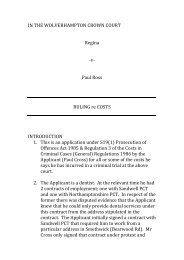You also want an ePaper? Increase the reach of your titles
YUMPU automatically turns print PDFs into web optimized ePapers that Google loves.
The issue is complicated because two different questions are being asked. In
relation to the principal, the issue relates to a consequence, whereas for the
accessory, the issue is partly at least about someone else’s state of mind.
It is clear that foresight is no longer to be equated with intent, but is rather
evidence of intent. Is there, however, a minimum degree of foresight that must
be required before the jury can find that the aider/abettor has the required
intention?
The common law, in the context of murder at least, imposes a high threshold on
the types of foresight from which a jury will be entitled to infer intent. After a
period of 25 years or so of incremental narrowing (i.e. from Hyam v DPP [1975]
AC 55 to Woollin [1999] 1 AC 82), the House of Lords finally agreed in Woollin
that:
• a jury is not entitled to ‘find’ that the defendant intended to kill or cause
really serious harm unless they conclude that death or really serious
harm was a virtually certain consequence, barring some unforeseen
intervention, and the defendant appreciated that this was the case
There is a threshold on foresight – anything less than foresight of virtual
certainty will not be sufficient to entitle the jury to find intention
In Jogee, the Supreme Court was silent as to any threshold of foresight that a
secondary party must possess before the jury will be entitled to infer the
requisite intent. Will the defendant’s foresight of even the slightest possibility of
the principal intentionally acting in the proscribed way be sufficient for a jury to
be entitled to infer that he possessed the requisite intention? Alternatively, does
there have to be a high level of foresight before the jury will be entitled to infer
from this foresight that he possessed the requisite intention?
I return back to the controversy as to whether or not there is a difference any
longer between the requisite intention in a principal and in an aider/abettor.
12










